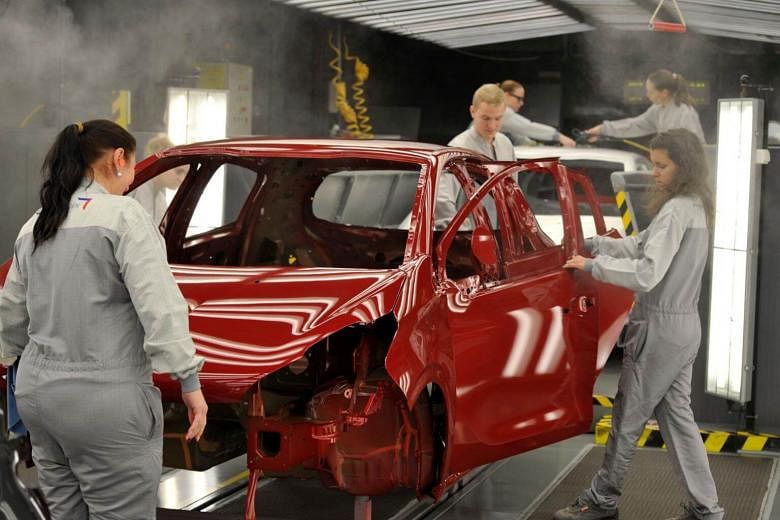BRATISLAVA, SLOVAKIA (AFP) - As the world's largest per capita car producer, Slovakia stands to be hit hardest if US President Donald Trump makes good on his threat to impose a 20 per cent tariff on cars imported from the European Union, analysts say.
Mr Trump's threat was the latest salvo in an escalating trade war that saw the EU slap duties on US-made jeans and motorcycles in a tit-for-tat response to US tariffs on European steel and aluminium exports.
The spectre of US tariffs that sent shares in Fiat Chrysler, Daimler and BMW tumbling on European stock exchanges also spooked Slovakia's automotive sector.
It boasts Germany's Volkswagen - which is Slovakia's biggest private-sector employer - France's PSA and South Korean Kia along with more than 300 automotive supply companies.
All told, they generate more than 300,000 jobs in the eurozone country of 5.4 million. Jaguar Land Rover will also open a new plant in September.
This makes Slovakia the EU's leading car and car part exporter to the US in terms of share of GDP - and the most vulnerable to tariffs.
"The ratio of overseas car exports to Slovakia's GDP is significantly the highest among all countries of the EU, with it being up to 1.7 per cent," the Slovak Institute for Financial Policy (IFP) said in a study.
"An increase in customs duties on car imports would have the biggest impact on Slovakia," it concluded.
As the only Slovakia-based carmaker that exports directly to the US, Volkswagen - and its many local suppliers - will suffer the most should US tariffs be slapped on the high-end Touareg, Audi Q7 and Porsche Cayenne models produced at its Bratislava plant.
Overall, the carmaking sector has a 44 per cent share of Slovakia's total industrial production and 35 per cent of its exports.
Last year, 1,001,520 cars rolled off assembly lines in Slovakia and exports were worth 3.7 billion euros (S$5.9 billion).
Annual production has exceeded one million cars in each of the last three years and is forecast to grow by more than a third by 2020.
A 25 per cent tariff on cars could cost Slovakia approximately 90 million euros, according to IFP calculations.
Tariffs would "definitely pose a challenge for Slovak carmakers reaching out to customers in the United States", Jan Pribula, Secretary General of the Automotive Industry Association of the Slovak Republic (ZAP), told AFP.
Slovak Economy Minister Peter Ziga has said that Bratislava would rally for unity across the EU in the interests of keeping the car sector tariff-free.
Carmakers based in Slovakia have so far declined to comment on possible US tariffs.
"As these plans are only speculations, we will not comment on them," Volkswagen Slovakia spokesman Michal Ambrovic told AFP.
The German company's Slovak operation produced 361,776 cars last year, and 99.7 per cent of its production was exported, with 20 per cent to the US, according to an internal report made available to AFP.
Groupe PSA Slovakia, maker of Citroën C3 and Peugeot 208 in Trnava, also declined to comment on the tariff impact, but spokesman Peter Svec did say that its plant does not sell to the US market.
PSA produced 335,296 cars in 2017, 91 per cent of its production was sold to customers EU countries, according to the company annual report.
KIA Slovakia spokesman Andrej Sahaj also confirmed that sales of its vehicles are restricted to Europe.

